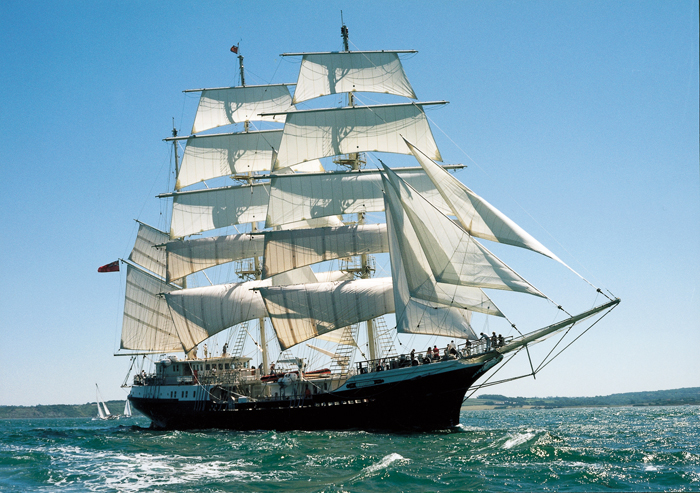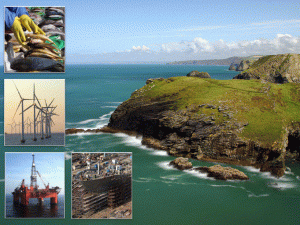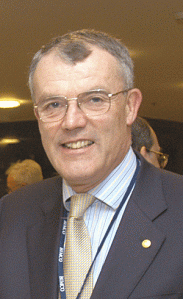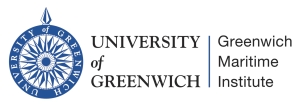Though it may be commonplace for a ship spotter to see sailing yachts or Thames Sailing Barges moving through the Old Father Thames, a tall ship in the size of Cutty Sark appearing in the narrow basin of the South Quay is still kind of a thrill. Owned by the Jubilee Sailing Trust (JST), the Tenacious, a traditionally-rigged three-mast sailing ship, more than 60 m in length and more than 40 m in height above the waterline, came back to London on 18 May 2014 and stayed in the dock until 25 May. She is alleged to be the largest tall ship flying the red ensign, about 1.5 times larger than her only sister ship, the Lord Nelson.
As part of a joint sail training promotion initiative, the China Sail Training Association (China STA), a partner of the JST, invited Greenwich Maritime Institute (GMI), University of Greenwich UG) to pay a visit to the Tenacious to observe the structure of a tall ship and the particular organisation and operation of her teamwork. Four UG members, Professor Chris Bellamy, Director of GMI, Dr Minghua Zhao, Director of China Maritime Centre which is part of GMI, Mr Yifan Liao and Captain Pengfei Zhang, both CMC members, embarked on the marvelous barque in the afternoon on 19 May, 2014.
The Tenacious is the second tall ship built by the JST to meet the increasing demand for sail training. Besides the permanent crew (consisting of the shipmaster, deck officers, engineers, medical purser, cooks, etc), the Tenacious was designed to accommodate some 40 trainees (the voyage crew) as well. This function implied that the structure of the accommodation would have to be much more complicated than a conventional cargo ship. As a result the ship was constructed in a very special way. After the keel-laying ceremony taken place on 6 June 1996, during which HRH the Duke of York hammered golden rivets into the planks, the hull was nevertheless constructed up-side-down and then turned to the upright position for outfitting. She was eventually launched on 3 February 2000 and christened 6 April 2000.
While showing the GMI/CMC delegation around, the duty officer illustrated how to set sail with joint effort, what individualised watching responsibilities of the crew are and what facilities are available to help people with restricted eyesight or wheelchair users. In the Accommodation, Minghua noticed a plaque with the tricky word “Heads” hung on the door of a compartment. This is virtually a very traditional seafaring jargon stemming from Nelson’s “golden age of sail”. Undoubtedly, it is only on a sailing ship as such that everyone could smell a real salty taste of the sea everywhere, – a memory of the hardship, courage, devotion, comradeship and pride that our ancestors had once experienced in their sailing lives. To those who are still perplexed with yet interested in the meaning of this sailor’s expression, it is recommended to refer to Roy & Lesley Adkins’ “Jack Tar” (at P. 140) for detailed explanation or to go straightaway to the bow of our neighbouring Cutty Sark to see the self-explanatory facilities inside the similar chambers.
The Tenacious provides equal access to all people of mixed physical ability, able or disabled, young or aged, male or female, with or without seafaring experience. The sea-going duration varies from one day to several weeks, depending on the length of the particular sea leg, in which the intake is involved. Unlike professional nautical skill training, the highlight of the experience in going to the sea on board the Tenacious is to learn how to work efficiently together with other people with diversified backgrounds and how leadership is shaped. To the young generation who are brought up in the “greenhouse” without exposure to the sea, it is arguable that, as far as you can overcome the challenges of the voyage in collaboration with your comrades, you will be able to survive all ordeals throughout the rest of your lifetime.
JST is planning to send their tall ships to explore the South Pacific Ocean in the second half of this year (2014) with the hope to visit China in the return voyages, whilst the China STA has registered to take part in the Falmouth to Greenwich Regatta in September 2014 to inaugurate their enterprise in China, – the only major maritime nation in the world that has yet to possess its own tall ship. Evidently GMI/CMC are the unrivalled partner to support these sail training events. With the support of the China STA and the Royal Borough of Greenwich and the strong recommendation from Dr Minghua Zhao, one Chinese postgraduate student from GMI’s Maritime History Program has joined the voyage crew for the Falmouth-Greenwich passage and undertaken to steer the celebration at the destination as a goodwill gesture to the proposed maritime adventure. Dr. Zhao is also elaborating a promotional plan for the voyage to be executed through her networking in China. There remains quite a lot of work to be done by our GMI/CMC crew to broaden the horizon for the tall ship world.









